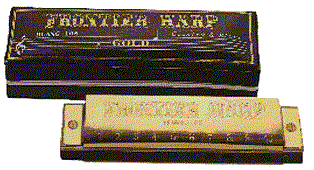 |
|
|
|
|
|
|
|
|||||||||||||||||||||
| Which Harmonica Should Be My First Diatonic? | ||||||
|---|---|---|---|---|---|---|
|
Which Harmonica Should Be My First Diatonic? I’ve tried several of the inexpensive “beginners” harps, but found most to be cheaply made and leaky, and actually harder to learn some techniques on, such as bends. The one exception I have found to the “cheaper is harder” rule are Huang Harmonicas . The Huang Frontier Harp only costs about five bucks, but is well made and airtight and the reeds are easily bent, so that learning bends and single notes is much easier than on other “beginner” harps. Let’s face it, you don’t need any added obstacles when you are learning these techniques, they are hard enough already.
The Frontier Harp comes only in the keys of C and G, (harmonicas come in twelve different keys) but since most instructional material is written with the key of C harmonica in mind, this works out real well for a first harp. Why do I recommend an inexpensive harp to start instead of a "professional" model? Most beginners are very hard on harmonicas until they refine their technique and learn to make the reeds speak without putting undue pressure on them. Often a reed to go flat or even break in the matter of a week or two, and some beginners go through several harps before they learn to moderate their technique. I would rather tear up a couple of $5.00 harps when I'm learning than several $20.00 ones. If you decide that you want to buy keys other than C and G when you're just getting started, Huang’s other models come in all keys and still don’t cost a fortune. There are some well-known pros that use Huangs every day, such as Mark Hummel, Peter “Madcat” Ruth (voted harmonica player of the year by SPAH, The Society for the Preservation and Advancement of the Harmonica), Norton Buffalo (Steve Miller’s harp player), Sugar Blue, and Stevie Wonder. If you want a "better" set of harps
after you have gotten past the rank beginner phase,
check out the suggestions below for some guidance. Three Things You Should
Know Before You Buy Your Next Harmonica Choosing the right harmonica for you will depend a lot on your style of play and the music you play. Get the right harmonica and it will be a joy to play. Get the wrong one you will struggle with it and quickly become frustrated. To make the right choice here are some things you need to consider: 1. Cover design Cover designs such as the Golden Melody and Suzuki are a natural for pucker. Don't get me wrong, you can still pucker or tongue block on any harmonica. But some cover designs do feel better for certain styles of play, making it easier to hit the note you want cleanly. Cover design is definitely something to think about when choosing your harmonica, if you want a harmonica that fits comfortably in your mouth for your style of play. 2. Action So what does all this mean? High quality harmonicas offer fast action and better response. Medium priced harmonicas offer medium action but not the greatest response. While cheap harmonicas offer slow action and poor response. If you just want to make some noise, or are just getting started, go for a cheap harmonica. If you want a fairly good practice harp, get a medium priced harp. But if you really want to make music I would suggest buying a quality harmonica. Of course a lot of this depends on how the harmonica is set up in the first place. But in general this has been my experience with off the shelf harmonicas with no customization. 3. Power There are certain things to consider even on a plastic comb harmonica. The reed plates on some harmonicas are recessed into the comb itself, providing a more air tight fit between the cover, the comb, and the reed plates. Example of harps of this type would be the Special 20, Lee Oskar, Suzuki Bluesmaster, and Hering Blues. Other harmonicas, such as the Huang Slivertone, do not have the reedplates recessed into the comb. These can be a little less air tight as the covers rest on the reed plate it self and sometimes can be a source of air leaks. There are however some very high quality, air tight, harmonicas build this way, such as the Suzuki Promaster or Hohner Meisterklasse, but less expensive harmonicas with this type of construction may tend to be more leaky. Whatever your level of play, whether a seasoned pro or just starting out, these three things will help you choose the right harmonica for you.
|
|
|||||
Coast to Coast Music • PO Box 1857 • Ellicott City, MD 21041
E-Mail: coast2coastmusic@yahoo.com • Telephone: 800-776-5015 • Fax: 410-750-3570
Privacy | Safety Guarantee | Shipping | Returns | FAQ | Contact Us
All contents © 1995 - 2004 Coast to Coast Music. All rights reserved.
